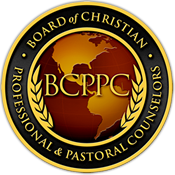
Requirements
Everyone who applies for a credential with the BCPPC must specify the level of credentialing he/she is seeking by utilizing the correct Application Form. Currently, the BCPPC offers four national credentials in Christian Counseling, two of which are in the Licensure/Professional Track (Professional Christian Counselor and Christian Counselor) and two of which are in the Pastoral/Ministry Track (Pastoral Counselor and Biblical Counselor). Individuals, who meet the requirements for any given credential, may also be eligible to receive more than one designation and can request consideration when submitting the application packet.
Regional and/or National Accreditation – This refers to a term used in the United States to describe the process whereby one of six accrediting bodies, each serving a specific geographic region, accredits schools, colleges, and universities:
- the New England Association of Schools and Colleges (NEASC)
- the North Central Association Commission on Accreditation and School Improvement (NCA)
- the Middle States Association of Schools and Colleges (MSA)
- the Southern Association of Schools and Colleges (SACS)
- the Western Association of Schools and Colleges (WASC)
- the Northwest Association of Schools and Colleges (NWCCU)
These regional agencies are recognized by both the United States Department of Education (USDE) and the Council for Higher Education Accreditation (CHEA). Applicants may check their school’s status by searching the United States Department of Education database or the Council for Higher Education Accreditation database. Regionally accredited schools are predominantly academically oriented, non-profit institutions.
USDE and CHEA also recognize other national accrediting bodies, including:
- the Distance Education Training Counsel (DETC)
- the Association for Biblical Higher Education (ABHA)
- the Association of Theological Schools (ATS)
- the Transnational Association of Christian Colleges and Schools (TRACS).
Substantially Equivalent Accreditation – Other schools are nationally accredited and while it may be difficult, in some cases, to transfer credits (or an earned degree) to a regionally accredited institution because of potentially lower academic standards, they often undergo an identical or clearly parallel process in order to become officially recognized. Common to both regional and national accrediting bodies, is a very rigorous approval process that includes: a comprehensive application, a lengthy review of the school’s program and educational delivery methods, no excessive credit for life experience (greater that 20-25%) or fast-track learning where degrees can be awarded in a matter of weeks/several months, an on-site visit by an accrediting team, and ongoing oversight of the academic program
One distinguishing factor for both regionally and nationally accredited schools is that they are automatically eligible to participate in Title IV federal student financial assistance programs. Schools and degree programs that do not meet the above definitions/criteria, will not be considered as meeting the educational standards for either the Board Certified Christian Counselor (BCCC) or Board Certified Professional Christian Counselor (BCPCC) credential.
Everyone who applies for a credential with the BCPPC must specify the level of credentialing he/she is seeking. Currently, the BCPPC offers four national credentials in Christian Counseling, which are the BCBC (Board Certified Biblical Counselor), the BCPC (Board Certified Pastoral Counselor), the BCCC (Board Certified Christian Counselor), and the highest level of credentialing, the BCPCC (Board Certified Professional Christian Counselor). Individuals, who meet the requirements for any given credential, may also be eligible to receive more than one designation and can request consideration when submitting the application packet.
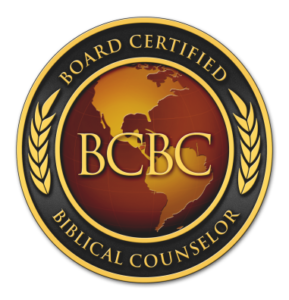
BCBC – Board Certified Biblical Counselor
Basic Requirements:
- Identify and practice as a lay Christian counselor – small group facilitators, church-based lay counselors, hospice workers, registered nurses, bachelor level social workers, substance abuse counselors, group home workers, etc., who are engaged in significant counseling/caregiving ministry.
- Be able to document at least one year of experience in counseling-related activities or lay caregiving and be in an active relationship with someone who provides oversight and accountability.
- A minimum of 90 contact hours of education/training in counseling and/or caregiving related to the incorporation of biblical principles and counseling skills with theory, knowledge, and practice.
- Maintain at least 20 Continuing Education contact hours every two years related to the incorporation of biblical principles and counseling skills with theory, knowledge and practice.
Additional Supportive Documentation Required:
- Copy of earned degree(s) if applicable.
- Documentation demonstrating that education/training incorporated biblical principles and counseling skills with theory, knowledge, and practice.
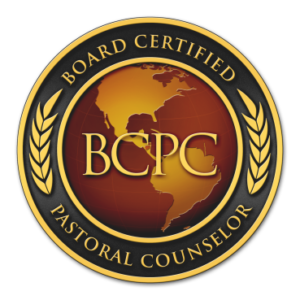
BCPC – Board Certified Pastoral Counselor
Basic Requirements:
- Minimum of a Bachelor’s degree from a regionally accredited college or university, ordination, religious licensure, and/or certification from a recognized entity – pastoral counselors with state sanction, national certification, denominational recognition, and/or religious licensure.
- Identify and practice as a Christian counselor – pastors, chaplains, associate/assistant pastors, youth ministers, pastoral counselors, etc., who are engaged in significant counseling ministry in church, para-church settings, Bible colleges and seminaries, and pastoral counseling agencies.
- Be able to document a minimum of one year of experience in counseling-related activities and caregiving.
- A minimum of 60 contact hours of education/training in counseling and/or caregiving related to the incorporation of biblical principles and counseling skills with theory, knowledge, and practice.
- Maintain at least 20 Continuing Education contact hours every two years related to the incorporation of biblical principles and counseling skills with theory, knowledge and practice.
Additional Supportive Documentation Required:
- Copy of ordination, religious license, appropriate certification and/or credentials.
- Documentation demonstrating that education/training incorporated biblical principles and counseling skills with theory, knowledge, and practice.
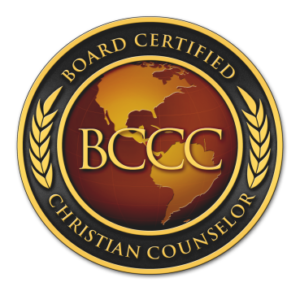
BCCC – Board Certified Christian Counselor
Basic Requirements:
- An earned master’s or doctorate degree in counseling or a related mental health field from a regionally or nationally accredited college or university OR those with an earned bachelor’s degree meeting the same criteria above may qualify IF they also hold a valid and current mental health license or certification to practice at the state level.
- Identify and practice as a Christian caregiver – non-licensed, pre-licensed, or restricted-licensed individuals who have a registration, certification, or state sanction of some kind in allied professional, counseling, and/or teaching roles and who incorporate biblical principles and counseling skills with clinical theory, knowledge, and practice.
- A minimum of 60 contact hours of education/training in counseling and/or caregiving related to the incorporation of biblical principles and counseling skills with clinical theory, knowledge, and practice.
- Maintain at least 20 Continuing Education contact hours every two years related to the incorporation of biblical principles and counseling skills with clinical theory, knowledge and practice.
Additional Supportive Documentation Required:
- Copy of earned degree(s).
- Copy of any and all registration letters as a Resident or Intern, restricted-use licenses, appropriate certifications, and/or credentials.
- Copy of current professional liability insurance certificate showing both expiration date and coverage (if needed).
- Documentation demonstrating that education/training incorporated biblical principles and counseling skills with clinical theory, knowledge, and practice.
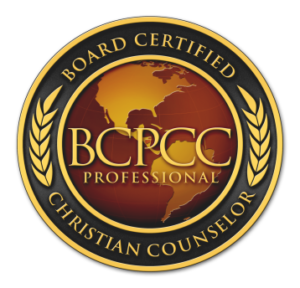
BCPCC – Board Certified Professional Christian Counselor
Basic Requirements:
- An earned master’s or doctorate degree in counseling or a related mental health field from a regionally or nationally accredited college or university.
- Have a master’s or doctoral level license issued by one of the 50 states, territories, or Canadian provinces, as a fully independent mental health practitioner (not requiring any clinical supervision) – licensed psychologists, professional counselors, mental health counselors, marriage & family therapists, clinical social workers, clinical nurse specialists/practitioners, substance abuse providers, and psychiatrists.
- Identify and practice as a Christian caregiver – fully licensed mental health professionals who incorporate biblical principles and counseling skills with clinical theory, knowledge, and practice.
- A minimum of 60 contact hours of education/training in counseling and/or caregiving related to the incorporation of biblical principles and counseling skills with clinical theory, knowledge, and practice.
- Maintain at least 20 Continuing Education contact hours every two years related to the incorporation of biblical principles and counseling skills with clinical theory, knowledge and practice.
Additional Supportive Documentation Required:
- Copy of earned degree(s).
- Copy of current, valid, and unencumbered professional license(s) to practice as a mental health professional.
- Copy of current professional liability insurance certificate showing both expiration date and coverage.
- Documentation demonstrating that education/training incorporated biblical principles and counseling skills with clinical theory, knowledge, and practice.
